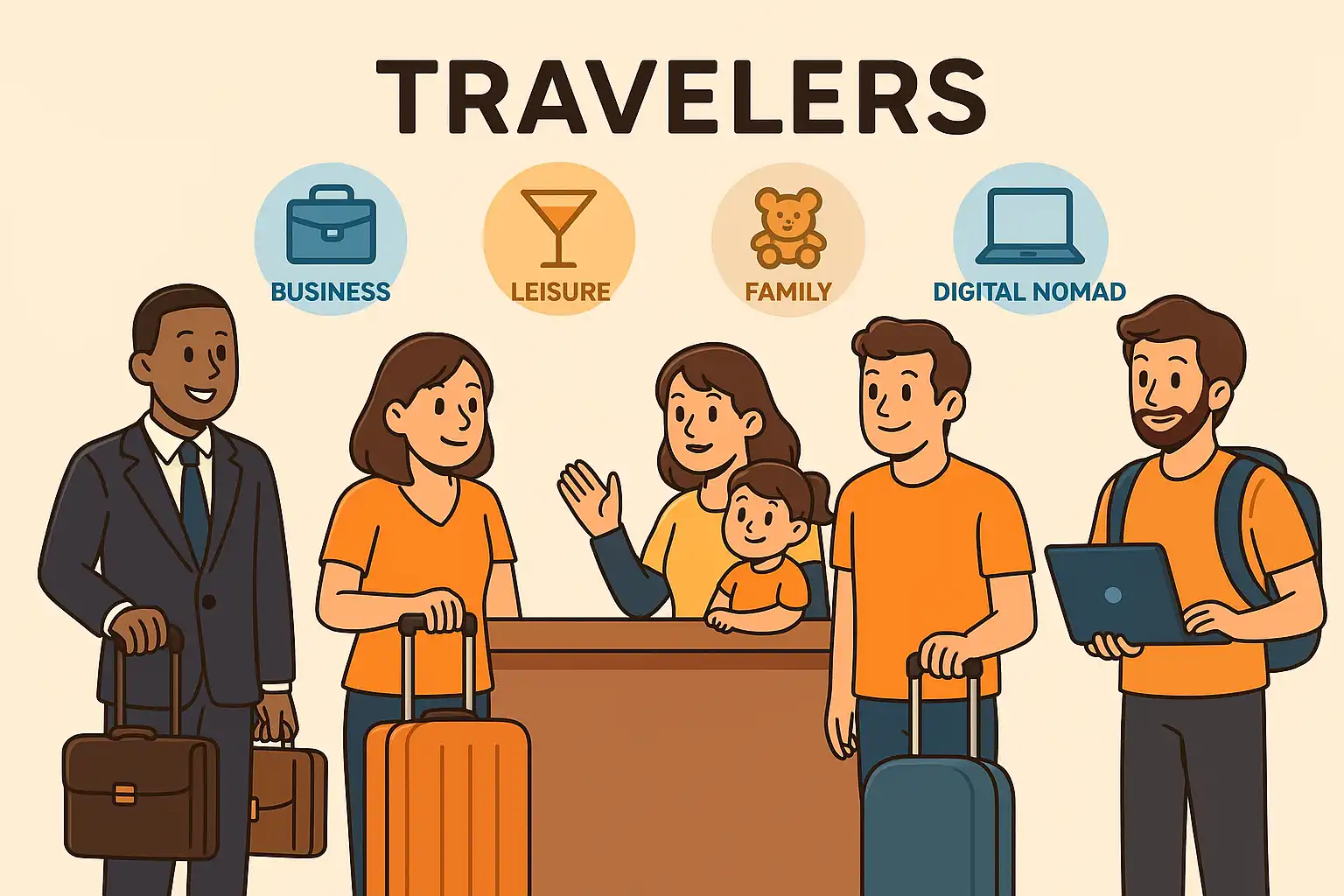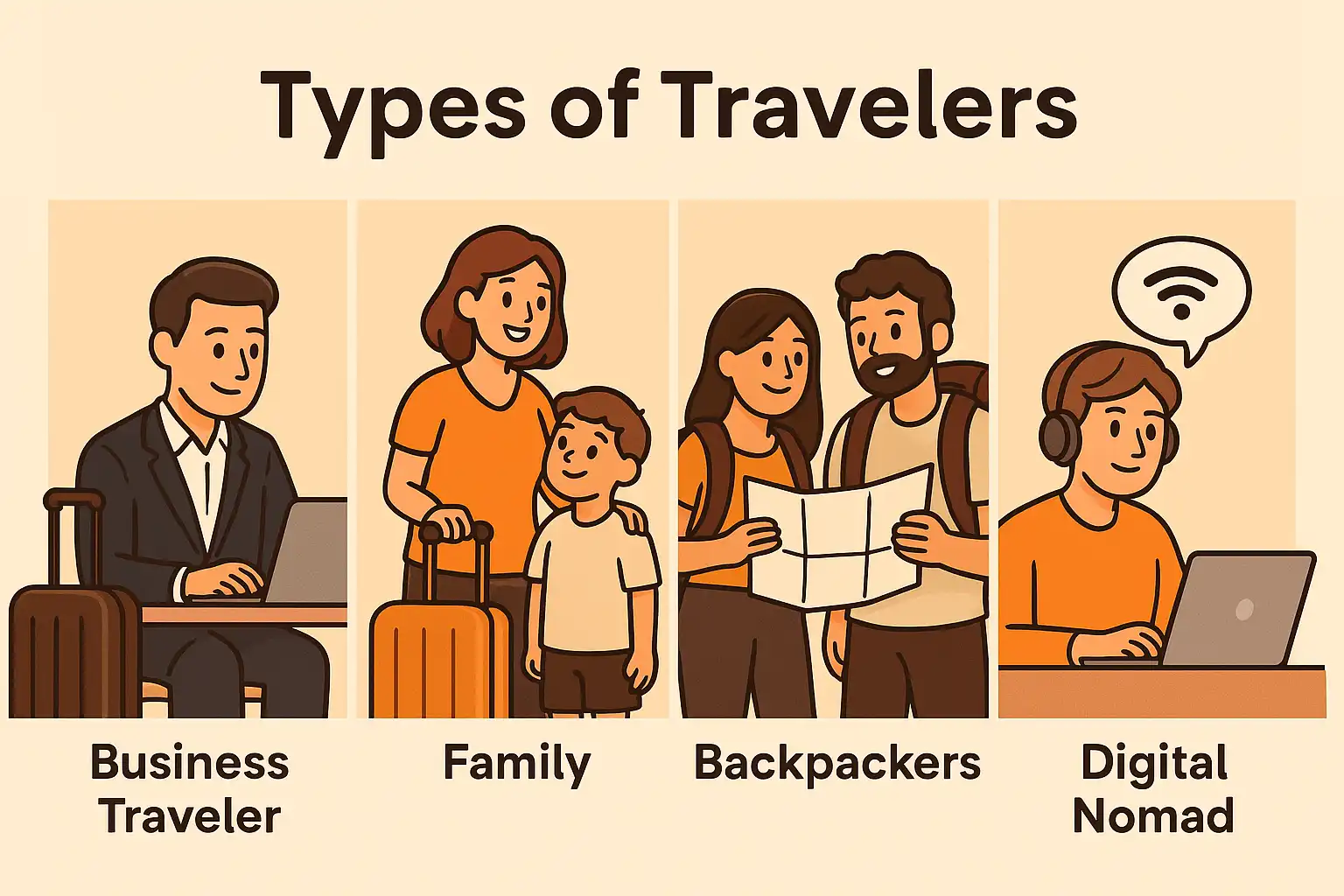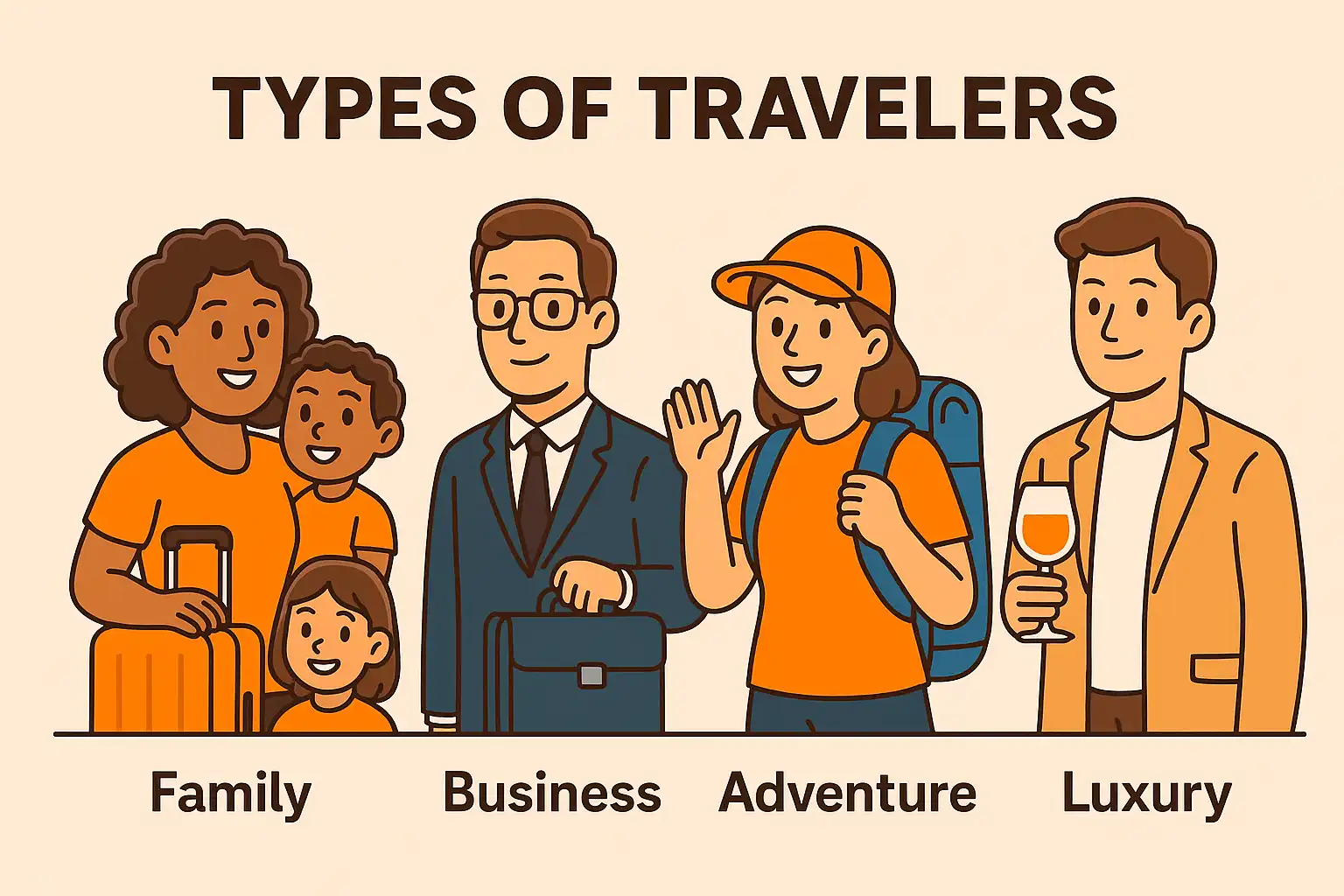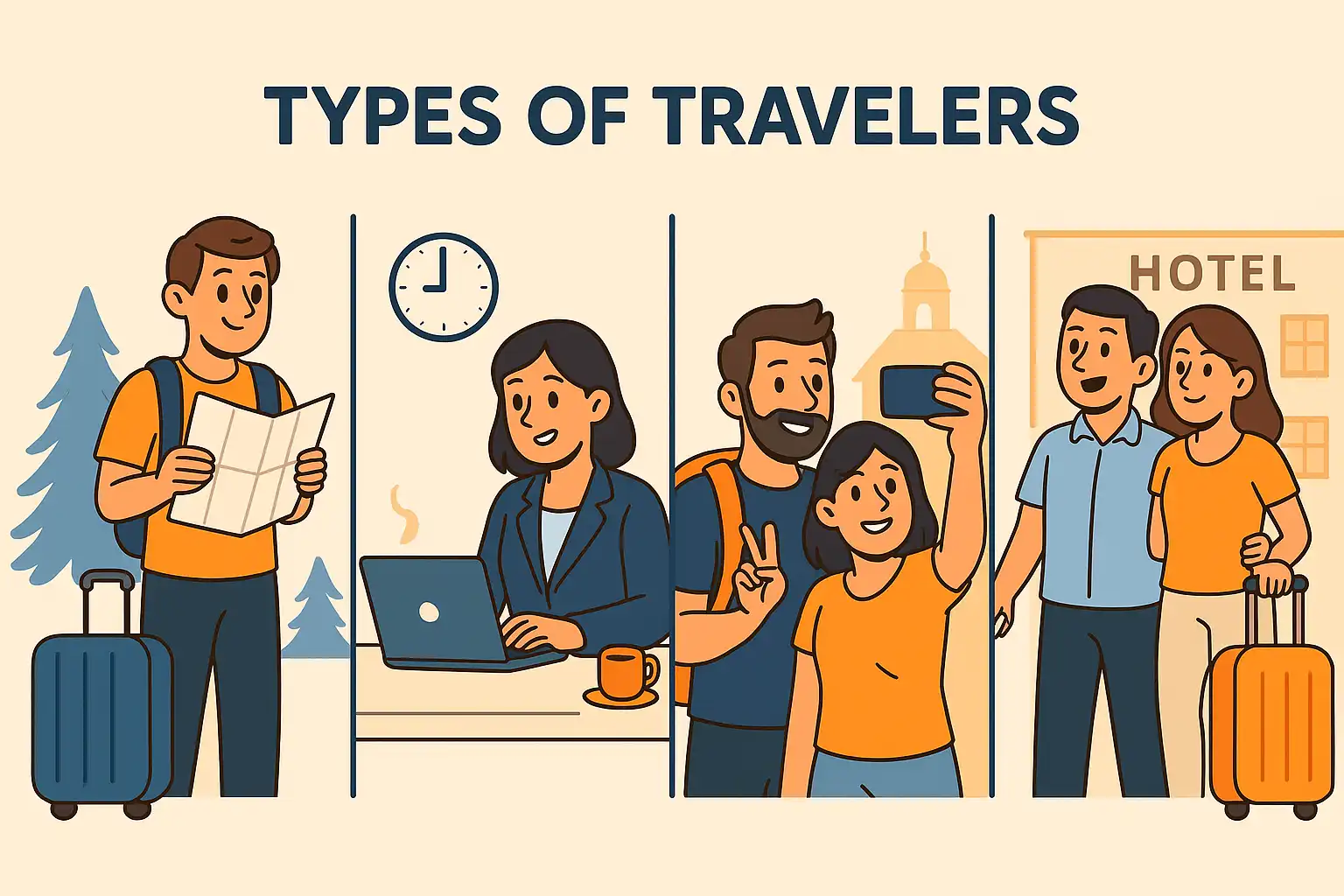Types of Travelers: The Ultimate Guide for Hoteliers
 Mika Takahashi
Mika Takahashi Mika Takahashi
Mika TakahashiIn today’s bustling hospitality world, understanding the unique needs and preferences of different types of travelers can truly set your hotel apart. With over 1.4 billion international arrivals each year, plus countless domestic trips, the travel landscape is incredibly diverse. Every guest walks through your doors with their own expectations, spending habits, and booking styles — all of which have a direct impact on your hotel’s success.
For hoteliers, this diversity is both a fantastic opportunity and a bit of a puzzle. Think about it: a business traveler dropping in for a quick overnight stay has very different priorities than a family on their annual holiday. Luxury travelers searching for exclusive experiences are worlds apart from budget backpackers eager to explore new destinations without breaking the bank. Getting to know these different types of travelers isn’t just about offering better service — it’s about boosting your revenue, filling rooms more consistently, and carving out a competitive edge in a crowded market.
This guide dives into the wide array of traveler types you’ll encounter, from corporate executives and digital nomads to thrill seekers and wellness fans. We’ll explore what motivates each group, what they expect from your property, smart pricing strategies, and most importantly, how to tailor your offerings to keep guests happy and your bottom line healthy. Whether you want to attract fresh faces or better serve your loyal clientele, this resource is designed to help you turn the diversity of types of travelers into your greatest asset.

Running a hotel today means so much more than just providing a bed for the night. Travelers come with a complex mix of motivations, preferences, and spending habits — and understanding these different types of travelers can make all the difference in how well you capture their business. Different types of travelers bring different budgets, booking patterns, and expectations, all of which influence your revenue far beyond just the nightly room rate.
Research shows that hotels using targeted segmentation strategies can boost occupancy rates by up to 25% compared to those treating all guests the same. That’s because they’re better at matching services to what guests actually want, spending marketing dollars more wisely, and pricing rooms to capture maximum value from each types of travelers. For example, business travelers might book last minute but pay premium rates, while families plan months ahead and look for package deals — knowing this helps you adjust your revenue management to fit.
When you understand what drives your guests, you can optimize your pricing, create appealing package deals, and spot upselling opportunities throughout your hotel. A luxury traveler interested in wellness experiences offers a different revenue chance than adventure travelers chasing authentic local culture. By recognizing these patterns among types of travelers, you can craft targeted packages that command higher rates while delivering exactly what your guests value. This strategy not only boosts immediate income but also lays the groundwork for long-term growth.
Segmenting your guests properly also means happier customers, better reviews, and more repeat bookings. When travelers feel your hotel truly gets their needs, they’re more likely to come back and recommend you to fellow travelers with similar tastes. This kind of organic growth cuts down your marketing costs and builds a more predictable revenue stream. Plus, by catering to multiple types of travelers, your hotel can maintain steady bookings year-round, since different groups tend to peak at different times.
The secret is realizing that segmentation isn’t about limiting who you appeal to — it’s about expanding your reach strategically. By understanding the full range of types of travelers and their unique needs, you position your hotel to capture value from many segments while running your operations efficiently and profitably.
Business travel makes up roughly 30% of hotel bookings worldwide, making it a crucial segment for hoteliers to understand and serve well. This group includes everyone from corporate executives on short trips to the growing number of digital nomads blending work and travel. These types of travelers usually prioritize efficiency, reliability, and connectivity over leisure perks, but they also tend to have higher budgets and less sensitivity to price than vacationers.
The business travel segment offers some fantastic advantages: higher average daily rates, frequent repeat visits, and steady demand that helps smooth out occupancy during slower times. But to win their loyalty, you need to recognize the different subgroups within business travel and customize your services accordingly.
Corporate travelers are the backbone of weekday hotel stays in major cities. They’re focused on speed, consistency, and smooth service during their often short 1-3 day visits. Their goal is to get business done quickly, so seamless experiences are key to winning their repeat business.
Must-have amenities for these guests include high-speed WiFi everywhere, access to business centers with printing and meeting rooms, quick check-in and check-out, and reliable room service available late into the evening. Since many work long hours and have early meetings, 24-hour food options are a big plus. Ergonomic desks, good lighting, and plenty of power outlets in rooms are expected, not optional.
Business travelers also bring revenue beyond just room rates. Corporate contracts can provide steady volume with guaranteed availability and negotiated pricing. Meeting room rentals, airport shuttles, premium breakfasts, dry cleaning, and fitness centers all add to the bottom line. These types of travelers usually book Tuesday through Thursday, avoiding holidays and summer breaks, which gives you a great chance to optimize rates and occupancy during the week.
Remote work has created a whole new breed of business traveler: the digital nomad. These guests work while exploring the world, often booking longer stays of one to four weeks with flexible terms and specific workspace needs that go beyond traditional business travelers.
For digital nomads, reliable, fast internet is absolutely essential—it’s their lifeline. They also appreciate co-working spaces, kitchen facilities for longer stays, and laundry services. Community areas where they can meet other remote workers or locals are a bonus, offering opportunities for your hotel to foster connections.
Typically, digital nomads are tech professionals, freelancers, and consultants aged 25-40 who value experiences and flexibility over traditional career paths. While they often have decent disposable income, they’re mindful of accommodation costs since they fund extended travel. They carefully research destinations and make choices based on cost, amenities, and location.
Pricing for digital nomads should focus on attractive weekly and monthly rates that offer discounts compared to daily pricing while keeping occupancy strong. Loyalty programs tailored to extended stays can build lasting relationships with these types of travelers who often move around continuously. Many hotels now offer “nomad packages” that bundle workspace access, weekly cleaning, and community events—drawing this segment while maintaining profitability through longer stays and reduced turnover.

Leisure travel accounts for about 70% of hotel stays worldwide, making it the largest and most varied segment. Unlike business travelers who seek efficiency and consistency, leisure guests want experiences, relaxation, and value that make their precious vacation time memorable. This group includes families on annual holidays, couples celebrating milestones, and everything in between — each with their own needs and spending habits that savvy hoteliers can tap into.
Leisure travelers often make emotional decisions rather than purely practical ones. They’re investing in memories, so many are willing to pay extra for services and amenities that enhance their trip. But they’re also more price-conscious than business travelers and do plenty of research before booking, so managing your reputation and competitive positioning is key.
Families are one of the most rewarding yet complex groups to serve. These multi-generational types of travelers often need connecting rooms or family suites, cribs, rollaway beds, and a range of kid-friendly amenities that let parents relax while kids stay safe and entertained. Hotels that get this right can command premium rates for the peace of mind and convenience they provide.
Key services for families include suites with separate sleeping areas, kids’ clubs with supervised activities, pools with adult and children’s sections, and early dining options that fit younger guests’ schedules. Parents also appreciate in-room fridges for snacks and baby supplies, childproofed rooms, and easy access to laundry facilities for longer stays.
Revenue opportunities come from family packages bundling accommodation, meals, activities, and entertainment at attractive prices. Partnering with local attractions can bring in commission income while offering families convenient access to popular spots. Babysitting services let parents enjoy adult dining and entertainment, boosting revenue and enhancing the vacation experience. Some hotels even offer educational or cultural programs for kids, commanding premium rates while creating lasting family memories.
Families tend to book around school holidays, summer vacations, and major holidays, often planning 3-6 months ahead. This predictability helps you set pricing and staffing early. Families usually stay longer than other leisure segments, opening doors for weekly rates and package deals that increase revenue per booking and lower marketing costs per occupied room night.
Solo travel is booming, with independent guests ranging from millennial travelers chasing authentic experiences to Gen Z adventurers exploring new cultures, and empty nesters rediscovering themselves. Solo bookings have jumped 43% in the last three years, making this one of the fastest-growing leisure segments.
Solo travelers care deeply about safety, fair single supplement policies, and expert concierge advice for local experiences. They often want rooms with plenty of natural light and cozy seating for downtime, as well as public spaces where they can socialize if they choose. Security features like well-lit hallways, electronic key cards, and 24-hour front desk service help them feel at ease in unfamiliar places.
Upselling to solo travelers usually focuses on experiences rather than room upgrades. Spa treatments, guided tours, cooking classes, and restaurant recommendations at popular local spots appeal to those seeking authentic, worry-free adventures. Concierge services that highlight safe neighborhoods, reputable tour operators, and cultural events welcoming solo guests can make a big difference.
This group spans many ages and interests, but most share a desire for genuine local experiences, personal safety, and the freedom to explore at their own pace. Hotels that serve solo travelers well often earn a strong reputation in this community, leading to repeat bookings and great word-of-mouth.
Couples and honeymooners are among the highest-value leisure travelers, often willing to pay premium rates for intimacy, privacy, and special occasion touches. They celebrate milestones and want their trips to be unforgettable, making them prime candidates for luxury packages and personalized experiences that boost revenue well beyond the room rate.
Popular amenities include couples’ spa treatments, private dining, room decorations for special occasions, and champagne or welcome gifts. Romantic features like fireplaces, balconies with views, or soaking tubs are big draws. Privacy and personalized service are paramount — couples want to feel like the only guests in the hotel.
This segment usually books suites or premium rooms, often staying longer for special occasions. They’re less price-sensitive and willing to invest in premium experiences and add-ons. Demand peaks around Valentine’s Day, wedding season, and New Year’s Eve, but romantic getaways happen year-round for anniversaries and other celebrations. This steady demand lets hotels offer premium rates during slow periods and create romantic packages that set them apart. Partnering with local wedding planners, florists, and restaurants helps build comprehensive packages that generate revenue across multiple services while delighting couples.

Adventure travel has exploded into a $600 billion industry, fueled by travelers chasing authentic, transformative experiences beyond typical sightseeing. These experience-seekers are highly engaged and motivated, often planning trips around specific activities, cultural immersion, or personal challenges. They tend to be well-educated, with good disposable income, and willing to pay premium rates for unique access and expert guidance.
Adventure travelers are also powerful ambassadors for destinations and hotels, sharing their journeys on social media and travel platforms. This makes them valuable for organic marketing and authentic testimonials that attract like-minded travelers.
Adventure travelers seek outdoor thrills like hiking, skiing, water sports, mountain climbing, and extreme activities that push their limits. They need hotels that understand their gear storage needs, flexible meal times, and easy access to activity sites. These guests are happy to pay more for properties that support their adventures, not just provide a bed.
Ideal facilities include secure gear storage, early breakfasts or grab-and-go meals for dawn departures, shuttle services to trailheads, fitness centers, hot tubs for recovery, and laundry for extended stays. Some hotels offer on-site equipment rentals or partner with local outfitters, creating extra revenue and convenience.
Partnerships with adventure tour operators and gear companies open multiple revenue streams and position your hotel as an activity hub. Staff with local outdoor expertise can provide trusted recommendations and safety tips, enhancing guest satisfaction.
Adventure travelers typically stay 3-7 days and spend more on experiences than accommodation. They often travel in small groups or join organized tours, creating opportunities for group bookings and specialized services that boost revenue.
Culture vultures plan their trips around museums, historic sites, local traditions, and authentic cultural experiences that offer deep insights into a destination’s heritage and modern life. They’re often educated professionals, retirees, and international tourists aged 35-65 who see travel as a chance to learn and grow. Detailed itineraries focusing on cultural events and locations guide their accommodation choices.
Services they value include cultural tour bookings, local guide recommendations, museum partnerships, and insider access to events or sites. Concierge teams that can secure tickets to popular attractions, suggest authentic local dining, and provide historical context add great value. Some hotels offer cultural programming like art exhibits, lectures, or craft workshops, letting guests engage without leaving the property.
Cultural travelers include international visitors, regional heritage enthusiasts, and special interest groups. They tend to travel during shoulder seasons to avoid crowds, giving hotels revenue during slower times.
Revenue comes from museum and cultural site partnerships, commission on tours, and premium rates for rooms near cultural hotspots. Educational packages with expert guides and special access tours command higher rates and create memorable experiences that drive positive reviews and repeat visits.
Food-focused travelers plan entire trips around local cuisine, renowned restaurants, cooking classes, and food festivals. They usually have good disposable income, prioritize quality over quantity, and pay extra for authentic culinary experiences. Many are food bloggers or social media influencers, making them valuable for hotels aiming to build culinary reputations.
Offerings for foodies include partnerships with local chefs, on-site cooking classes, food tour packages, and trusted restaurant guides that go beyond typical tourist fare. Market tours followed by cooking classes, wine tastings, and exclusive dining events provide behind-the-scenes access to local food culture. These experiences often command premium rates and generate income through partnerships.
Food travelers often extend stays to enjoy multiple culinary experiences and upgrade to rooms with kitchen facilities for storing special ingredients. They research destinations thoroughly, rely on trusted culinary sources, and travel during food festival seasons, creating predictable demand.
Marketing should highlight social media showcasing of hotel restaurants, collaborations with culinary experts, and authentic food experiences. Staff with deep local food knowledge can provide recommendations and access, justifying premium pricing.

Budget travel makes up about 40% of global travelers, covering a wide range of guests who seek value, affordability, and authentic experiences over luxury. This group includes young backpackers traveling on tight budgets and savvy travel hackers who use points and deals to maximize trips while minimizing costs. Though they may not spend the most per night, they provide steady volume, longer stays, and act as ambassadors for value-focused properties.
Budget travelers don’t always mean cheap — many have decent budgets but prefer to spend on experiences rather than fancy accommodations. They often travel more frequently, stay longer, and research extensively to find the best value for their needs.
Budget travelers look for clean, safe places with essential amenities that offer great value. They shop around, read reviews carefully, and choose based on price-to-value rather than just low prices. They appreciate straightforward service and properties that deliver what they promise without extra frills that hike costs.
Important services include free WiFi, continental breakfast, easy access to public transit, and basic business services like printing. Locations near transit hubs, markets, and affordable dining help them explore economically. Simple extras like luggage storage, local maps, and knowledgeable staff who can share money-saving tips often impress more than pricey upgrades.
Revenue strategies focus on volume bookings, operational efficiency, and minimal frills that keep costs low but profits steady. Budget travelers often book directly to avoid fees, respond well to last-minute deals, and travel off-season for lower rates. Many accept longer stays with weekly or monthly discounts, ensuring steady occupancy and lower turnover costs.
Backpackers are a distinct budget traveler group, usually young and independent, seeking shared accommodations, social connections, and extended stays across multiple destinations. They prioritize authentic cultural experiences over hotel luxuries, often staying in hostels but increasingly choosing budget hotels with social atmospheres and a bit more privacy.
Backpacker essentials include dorm-style rooms, communal kitchens, secure luggage storage, and social spaces for meeting fellow travelers. Organized activities, common areas, and bulletin boards help them find companions for adventures or onward travel. Reliable WiFi is critical for staying connected and planning.
This group mainly includes students, gap year travelers, working holiday visa holders, and young professionals aged 18-30 who prioritize experience and socializing over comfort. They travel on tight budgets but often stay longer and return repeatedly. Positive experiences spread quickly in backpacker communities, bringing more guests.
Revenue models focus on bed-in-dorm pricing, group bookings, and extended stay discounts to encourage longer visits while maintaining profitability through high occupancy. Additional income comes from luggage storage fees, laundry, tours, and food sales in common areas. Social activities also generate commission and enhance guest satisfaction.
Travel hackers are savvy budget travelers who use points, rewards, promotions, and strategic booking to get the most out of their trips while spending the least cash. They travel frequently but minimize accommodation costs, making them valuable for hotels that understand their booking habits.
To attract travel hackers, offer loyalty program partnerships, flash sales, limited-time deals, and clear value packages. They book during promotional periods, actively participate in loyalty programs, and appreciate bonus point opportunities and status perks. They often book well in advance or last minute when deals appear.
Travel hackers tend to take many short trips yearly rather than a few long ones, creating chances for hotels to build repeat relationships. They often influence deal-sharing communities, bringing more volume when they spread the word about great offers.
Marketing to travel hackers involves deal websites, targeted emails, social media promotions, and partnerships with points communities. These types of travelers monitor deal sites and respond quickly to limited offers. Hotels partnering with deal bloggers and travel hacking influencers can amplify their reach to these eager audiences.
Luxury travel is a $1.2 trillion global market made up of guests who prioritize exceptional service, exclusive experiences, and personalized attention over price. These high-net-worth individuals generate the highest revenue per guest through premium rooms, extensive ancillary spending, and longer stays at exclusive properties. Understanding luxury travelers means recognizing they’re investing in experiences, status, and peace of mind that justify top-tier prices.
Luxury travelers often influence their social circles with their recommendations. They travel widely and choose accommodations based on reputation, service quality, and exclusive access rather than price. They usually book directly, join luxury loyalty programs, and expect seamless coordination across their journey.
These types of travelers expect personalized service, premium amenities, and exclusive experiences that justify paying well above standard rates. They’re seasoned travelers with high expectations shaped by stays at renowned luxury properties worldwide. Consistency, attention to detail, and anticipatory service are key.
Luxury services include personal concierge, private transportation, butler service, and access to exclusive amenities like private beaches, members-only clubs, or invitation-only events. Many appreciate unique experiences unavailable to typical tourists, such as private museum tours or meetings with local artisans. Personalization is crucial, with hotels maintaining detailed guest profiles to anticipate preferences and deliver flawless service.
Luxury travelers drive revenue far beyond room rates, often booking premium suites, using spa services, dining at high-end restaurants, and purchasing extras without hesitation. They frequently extend stays and book multiple rooms for family or staff when traveling in groups.
Booking patterns involve advance reservations for preferred dates and rooms, participation in exclusive loyalty programs, and direct relationships with properties. Many work with travel advisors specializing in luxury experiences. This segment often books during peak times, contributing to premium pricing.
Wellness tourism is one of the fastest-growing luxury segments, fueled by health-conscious guests seeking spa treatments, fitness options, retreats, and holistic experiences. It’s growing at about 7.5% annually, driven by rising disposable incomes and demand for experiences promoting relaxation and personal growth.
Wellness amenities include spa services, yoga and meditation classes, healthy dining, fitness centers, and wellness programming beyond typical hotel offerings. Some hotels provide detox programs, meditation retreats, fitness boot camps, and health consultations, often partnering with experts to deliver authoritative guidance.
Wellness travelers stay longer to complete programs or reach health goals, creating opportunities for extended packages and repeat visits. They often buy additional services like personal training, nutrition advice, and wellness products, generating revenue beyond accommodation and spa treatments.

Beyond the main traveler categories, there are many niche segments offering unique opportunities for hotels willing to adapt. These specialized markets often show strong loyalty and willingness to pay premium rates for tailored services. Understanding them helps diversify your guest mix and reduce reliance on any single traveler type.
Many specialized types of travelers research thoroughly and become repeat guests when their specific needs are met, often spreading positive word-of-mouth within tight-knit communities.
Social, Military, Educational, Religious, and Fraternal groups (SMERFs) require bulk bookings, meeting spaces, and services tailored to group dynamics. These bookings offer guaranteed occupancy for multiple nights and can generate significant revenue if managed well.
Services include block booking rates, meeting rooms with AV equipment, group dining accommodating dietary needs, and dedicated group check-in. Recreational activities, team-building facilities, and flexible spaces for formal and informal gatherings add value.
Group bookings provide steady occupancy, reduce marketing costs, and offer upselling opportunities like AV rentals and special dining. Many groups book during shoulder seasons or weekdays, helping maintain steady occupancy.
Planning often requires 6-18 months’ notice, flexible cancellation policies, and close coordination with organizers. Dedicated group coordinators ensure smooth experiences and maximize revenue.
Pet owners traveling with their animals are a rapidly growing segment, with 85% of pet owners traveling with pets annually. This trend has accelerated with remote work and longer stays. Pet-friendly hotels can charge premium rates and build loyalty among pet owners who have limited accommodation choices.
Pet amenities include beds, food and water bowls, designated walking areas, dog walking, and pet-sitting services. Some hotels provide pet packages with toys, treats, grooming, veterinary referrals, and pet photography, creating memorable experiences and extra revenue.
Pet travelers often travel more frequently and stay longer than families with children, offering opportunities for weekly or monthly rates. Many pay extra for truly pet-friendly accommodations rather than places that merely tolerate animals.
Premium pricing includes pet fees, bundled pet packages, and premium rooms with better outdoor access or space. Hotels going beyond basic acceptance to offer genuine pet-friendly experiences earn positive reviews and repeat business.
Travelers with mobility, sensory, or cognitive disabilities need accessible accommodations that meet legal requirements and real user needs. This group represents 15% of the global population with $13 trillion in disposable income, making it both a business opportunity and compliance necessity.
Accessibility features include wheelchair-accessible rooms and public areas, hearing loops, visual alerts, braille signage, accessible bathrooms, and trained staff who assist respectfully. Partnering with disability organizations helps ensure genuine accessibility.
As populations age and awareness grows, accessible travel demand increases. Disabled travelers often come with companions, doubling booking value and requiring specialized services. Properties excelling in accessibility become preferred choices, generating repeat business and positive word-of-mouth.
Accessibility also benefits all guests, with wider doorways, better lighting, and clear signage. Specialized services command premium rates, offsetting costs and building community goodwill.
Bleisure travelers combine business and leisure, extending work trips to enjoy local attractions or bring family. This segment merges business spending power with leisure-seeking behavior, offering hotels chances to boost revenue and differentiate from competitors.
Services include flexible check-out, help booking leisure activities, weekend packages, and family-friendly amenities. Concierge teams recommending local sights and dining help travelers maximize limited free time.
Bleisure travelers stay longer, spend more on leisure and dining, and often upgrade rooms for their leisure portion, creating upselling opportunities. Peak bleisure times coincide with good weather or events, extending business bookings into leisure periods.
Travelers motivated by events, seasons, or occasions book predictably, allowing hotels to optimize pricing, staffing, and marketing. These guests often pay premiums for specific experiences or timing, aiding revenue predictability and operational planning.
Event travelers have less price sensitivity, enabling premium rates during busy periods. Careful planning ensures capacity matches demand surges.
Weekend warriors make the most of 2-3 day getaways, driven by work-life balance and frequent escapes. They often live nearby and seek high-value, efficient experiences. Typically wealthier than longer vacationers, they need quick service and streamlined stays.
Services include express check-in/out, local attraction packages, quick dining, and concierge recommendations for short stays. Loyalty programs for repeat weekend visitors encourage frequent bookings.
Weekend warriors often return to familiar destinations, willing to pay premiums for properties that understand their needs and deliver exceptional service.
Revenue strategies focus on weekend packages, local partnerships, and incentives for repeat visits. Multiple weekend trips per year can generate substantial annual revenue per guest.
Seasonal travelers visit for weather, activities, or natural events, booking months ahead for peak experiences. This predictability helps hotels plan pricing, staffing, and marketing.
Seasonal offerings align with activities like skiing, beach sports, fall foliage, or spring hikes. Hotels specializing in seasonal experiences position themselves as experts, attracting guests seeking optimal timing.
Dynamic pricing reflects demand, competitor rates, and guest willingness to pay. Many seasonal travelers accept higher rates during peak times, with promotions during shoulder seasons to maintain occupancy.
Planning cycles involve advance bookings 3-6 months ahead, allowing hotels to optimize resources and develop off-season strategies.
Attendees of conventions, conferences, weddings, festivals, or special events create concentrated demand that can boost revenue during specific times. These travelers have fixed dates and are less price-sensitive, allowing premium pricing during major events.
Services include conference rates, shuttle service, networking spaces, and catering for private events. Early breakfasts, business center access, and quiet workspaces support event needs.
Partnerships with venues, planners, organizers, and promoters generate revenue streams and position hotels as preferred event accommodations. Advance notice helps manage demand surges.
Booking patterns involve group blocks, advance festival reservations, and fixed dates, requiring careful pricing and availability management. Annual events create predictable demand for strategic planning.

Successfully using traveler segmentation means integrating insights into every part of your hotel’s operations — from marketing and pricing to guest service and post-stay engagement. Knowing each segment’s needs, preferences, and spending habits helps you tailor every interaction to maximize revenue and satisfaction.
Dynamic pricing based on segment demand lets you capture top value from each booking while staying competitive. Business travelers might pay premiums for last-minute bookings, while leisure guests respond better to advance discounts and packages. Understanding these nuances enables smarter revenue management than a one-size-fits-all approach.
Targeted marketing campaigns for high-value segments in your market maximize ROI. A downtown business hotel might focus on corporate travel and digital nomads, while a resort targets families and romantic getaways. Allocating marketing dollars to the right types of travelers avoids wasted spend on broad, ineffective campaigns.
Developing specialized packages and amenities that command premium pricing means matching offerings to what each segment values most. Adventure travelers pay for gear storage and expert guides, luxury guests expect personalized service and exclusivity. Knowing these preferences helps you boost average daily rates with genuine value.
Data analytics reveal your most profitable types of travelers, guiding marketing, staffing, and facility investments. Historical booking data, satisfaction scores, and revenue per segment show where to focus for maximum returns.
Training staff to recognize and serve different types of travelers ensures promises made in marketing translate into real guest satisfaction and repeat bookings. Front desk teams understand business traveler urgency, housekeeping caters to family needs, and concierge offers tailored recommendations.
Partnering with local businesses serving your target segments creates multiple revenue streams and positions your hotel as a destination hub. Adventure hotels team up with gear rentals and tour operators, business hotels with meeting venues and corporate services, generating commissions and seamless guest experiences.
Optimizing your online presence with SEO and targeted ads attracts diverse types of travelers effectively. Different segments search with different terms and book through different channels. Business travelers look for “hotels near convention centers,” adventure travelers for “mountain lodge gear storage.” Targeted content and ads capture the right traffic efficiently.
Ultimately, understanding types of travelers is about more than short-term revenue — it builds sustainable competitive advantage through exceptional guest experiences. Hotels that consistently exceed expectations for their chosen segments earn loyal guests, glowing reviews, and organic marketing that lowers acquisition costs and stabilizes revenue.
In today’s hospitality world, moving beyond generic service to become experts in serving specific types of travelers is key. Hotels that deeply understand their guests and deliver targeted experiences outperform those trying to please everyone but truly delight no one. The future belongs to those who make traveler type understanding the foundation of every decision, creating unique value that commands premium pricing while ensuring guest satisfaction across the board.